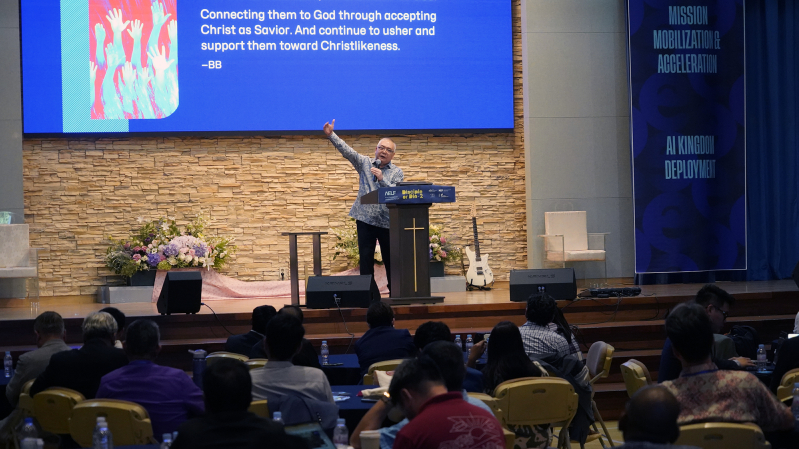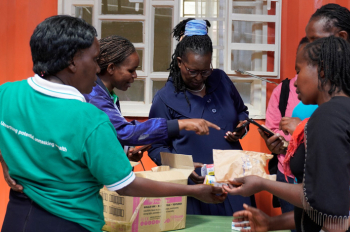
As church growth stagnates in many parts of the world, evangelical leaders at the Asia Evangelical Leadership Forum (AELF) in Seoul issued a clear call to return to the core mandate of the Christian faith: making disciples.
On the first full day of the three-day forum, Dr. Bambang Budijanto, General Secretary of the Asia Evangelical Alliance (AEA), delivered a keynote address that followed up on his opening remarks given the previous evening. Budijanto, who has led regional discipleship initiatives over the past six years, framed the current moment as one of both warning and opportunity for the global Church.
“The 20th century was a mission century,” he said. “Christianity grew rapidly, fueled by major revivals in Africa, China, Wales, and other regions, and leaders like Billy Graham mobilized millions. But that momentum has not continued into this century.”
He pointed to data showing that from 2000 to 2025, Christianity’s global share has risen only marginally, marking what he described as a period of stagnation.
According to Budijanto, responses to this trend fall into three categories: resignation to inevitable decline, cautious preparation for slower growth, or committed intervention to reverse the trajectory. “I hope we all come up with the third one,” he told the gathered leaders. “Is there a way to change this?”
Budijanto’s address centered on a renewed focus on the Great Commission in Matthew 28:19–20. He noted that in the original Greek text, the main command is not “go” or “teach,” but “make disciples.” The other verbs—going, baptizing, and teaching—serve as supporting actions.
“We have oversimplified the Great Commission into evangelism,” he said. “But Jesus didn’t just tell us to convert people. He told us to make disciples—people who follow Him and help others follow Him.”
He warned that evangelism without long-term, relational discipleship can result in shallow faith and hinder multiplication. “Disciples make disciples. Converts often do not.”
The New Testament model, he emphasized, is not merely about spiritual experiences or church attendance, but about transformation through intentional mentoring and obedience to Christ’s teachings.
Budijanto cited a 2015 Barna-sponsored study in the United States that showed only 20% of Christians are actively involved in disciple-making. A similar survey conducted in Indonesia showed 40% participation, but still a significant gap between knowledge and action.
“Four out of five Christians in the U.S.—one of the strongest Christian nations—are disobeying the last command of Jesus,” he said. “We sing worship songs and celebrate Christmas and Easter, yet we ignore His final instructions.”
When the survey examined how many believers were discipling someone outside the church, the number dropped to just 9.4%. Budijanto called this a “silent crisis” within the Church.
“Disciple-making cannot be optional,” he said. “It is the measure of our obedience and the pathway to revival.”
Budijanto described the Great Commission as a “leadership revolution” that empowers every believer to lead others into a growing relationship with Christ. “If you are following Jesus, you are a leader,” he said. “Leadership is not about status. It’s about influence and faithfulness.”
He defined discipleship as a process that leads people from spiritual distance to closeness with God—beginning with introducing them to Christ and continuing through spiritual growth, character formation, and leadership development.
“Many Christians are spiritually dying because they are not growing,” he said. “And when you don’t disciple others, you are watching them die—slowly, silently.”
Using the Pareto Principle—also known as the 80/20 rule—Budijanto proposed a strategy of focusing on the most responsive 20% of believers to catalyze wider transformation. In Asia, where the AEA estimates there are 215 million evangelicals, he suggested investing in 43 million of them to intentionally disciple others.
If each of these 43 million believers discipled just one person every two years, the total number of disciples in the region could double by 2035. Even allowing for setbacks or failure, such a strategy could yield more than 450 million active believers.
Budijanto proposed a similar approach for church planting. If just 20% of the region’s 62,000 evangelical churches planted one new congregation every two years, the number of churches could more than double in a decade. “This is not about heroic efforts—it’s about consistent obedience,” he said.
“Our goal is to double the Kingdom force by 2035,” Budijanto concluded. “Not through big campaigns alone, but through multiplying what is already in our hands—faithful leaders, healthy churches, and obedient disciples.”
The Asia Evangelical Leadership Forum continues through June 13 at the Antioch Center in Seoul, bringing together more than 100 national leaders from over 20 countries to renew the region’s commitment to disciple-making and collaborative mission.






